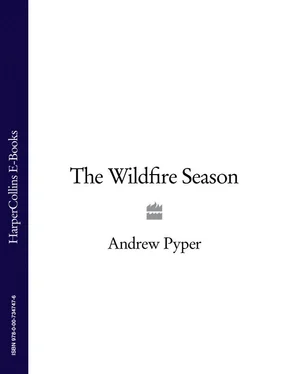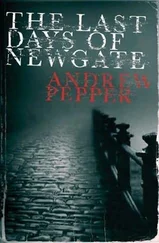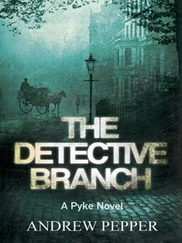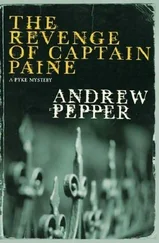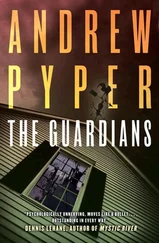He thinks of what he would give in dollar terms to sleep without dreams until morning. Starts at two-fifty and soon approaches everything he has.
It’s not guilt. Not exactly. It’s not yet worry, either. Tonight, what denies his rest is what the firestarter would say to him if it ever learned to speak.
Even from four miles off, during the few hours of a July night’s darkness, the bear can smell Ross River before she spots the orange glow of its homes. Melted lard, yeast, the generator’s dizzying fumes. All of it attracts her, so much stronger in its promises than the highbush cranberries and wild sweet pea, the only other food she can detect in the vicinity. They have been moving continuously for a full day without eating, and now hunger sharpens her senses as do the distant traces of smoke that have been pursuing them the whole time. She allows her cubs to rest, rolled back on their haunches, chewing at air. The three of them have made their way to the top of a rock outcropping that pokes through the treeline, midway up the slope of the Tintina Trench.
The sow has been here before. Last autumn, with her mate. It’s how she knows that, in daylight, they could see the entire Pelly valley from where they are. Now, with the dawn only a blue thread atop the horizon, the killing ground is a field of shadow. Below them, the town throbs in electric flames.
She doesn’t fear the people she knows to be there, but unless she has to, she will go no closer. It would be easy to push through one of the many breaks in the fence around the dump and feast on whatever spilled out of the piled bags she gutted. During the summer her mate stayed with her (far longer than other wandering, rutting boars), they would come here from time to time. The decision arose less out of necessity than as an addiction to the landfill’s exotic pleasures. On the rare occasions that the dump manager came by to throw the beam of his flashlight over one of them, the other would bark from the opposite direction, diverting his attention. The beam leapt blindly in his hands. In seconds the sow and her mate would be through the fence.
But there is only the cubs with her now. They have never been close to people, and she wonders if their curiosity would cause them to pause, blinking at the light. She has seen this hypnotism used on other animals by hunters in the woods at night. No amount of barking could wake them once the dazzling bulb had captured their eyes.
They will not go closer to town. They will not run any farther away either. Over the other side of the range to the south is a river that, by now, will be running with easily scooped grayling and trout. And here, in the St Cyr foothills, they are the only bears. Whatever food is available will be theirs without competition. She looks at her cubs. It will be another year before they will begin to make these calculations on their own, and for a moment, the thought of the time ahead exhausts her.
She lifts her snout and turns to the east in the direction they have come from. The cubs do the same. The oddly stringent smoke is still there. Stronger than the hour before. Though it hasn’t moved, the sow feels that it wants to. And when it does, it will come this way.
In the morning, Miles stands in the shower until the hot water in the tank goes dry, and after it does, stands a while longer under the cold. It doesn’t make him feel clean as much as raw, a layer of skin peeled off, leaving him tenderized. Sometimes it helps him to think. Today, the water draws all thought out of him, washing half-formed sentences down the drain. By the time he turns off the taps he’d be slow in coming up with his birthday, his postal code. When he steps out of the stall the only thing he recognizes is Stump’s tongue licking his legs.
Beyond the bathroom window the morning sun is so bright it looks to Miles like the prolonged flash of some distant megaton explosion. And maybe it is. It is a summer of fire everywhere but here.
Even in a place as disconnected as Ross River, the images of disaster have found their way to him. On the TV hanging from chains in the Lucky China’s ceiling, he has crunched and tartar-sauced his way through lunch while watching evacuations of famous ski villages and less-famous pulp towns on the lower mainland of British Columbia, the ruin of Washington State vineyards, flames licking against million-dollar glass cubes terraced over the hills of San Bernardino and the Simi Valley. Crews from as far as Ohio, Minnesota and Georgia have been dispatched to assist on the suburban infernos of Oregon and California. Reporters can’t get through a story without speaking of it, with a grimness only half disguising their excitement, as ‘possibly the worst wildfire season in living memory.’ Every time they use the phrase, Miles can’t help wondering whose living memory they’re talking about. He’s still alive. They should ask him sometime.
That the fires are so vast that smoke has been carried on the prevailing winds to redden the sun as far east as Winnipeg and St Louis might surprise some of the experts, but not Miles. He has seen a summer like this one coming for a long time. Global warming. Continental drought. Fuel loading. The last of these being the biggest factor. After years of urban sprawl and ‘development’ of what remains of the western forests, fighting fires has become more necessary in order to protect man-made values. The trouble is, the more smokers you put out, the more deadwood there is to blow up the next time around. Fire doesn’t like being made to wait.
When he’s dressed, Miles walks out to the main road and along the half mile to the fire office. The morning light continues to dazzle him, glinting off anything it can find, even the gravel, white as chalk. The rust-stained tin of the fire office looks as though it’s been painted silver overnight.
Miles had expected the place to be empty, but King is already there, sipping at a mug of instant coffee. When Miles walks in he barely turns. Dreamy. That’s what the kid is. Which makes him a little dangerous, too.
Patrick ‘King’ Lear is this year’s part-timer sent up from the University of Northern British Columbia’s forestry management program to fill out the crew. He’s not the worst that Miles has seen, a physically strong boy who obviously loves the bush and, like Miles, sees firefighting as a way to get paid for living in it. But there’s an absence about King that made Miles at first suspect the kid was on drugs of some sort, one of the new kinds that make you rapturously amazed by everything. Now, he has come to believe that this is simply King’s nature. What’s worrying is that, on a burn site, it’s not exactly the optimum mental state for your men to be in. Crookedhead may not be any better on the raw intelligence side of the ledger, and Jerry is always looking for a way out of the hottest or heaviest work, but at least their defects are predictable. With King, you can’t tell when he might stop clearing deadwood or hacking out a fireline, hypnotized by the beauty of embers floating through a stand of aspens. Miles can only thank Christ that there hasn’t been a fire of any substance for the length of his tenure as supervisor. They’re good men. He cares for them more than he’s comfortable admitting. But Miles would prefer to not see them tested by anything bigger than the bonfires of discarded mattresses they practise on out at the dump on Sundays.
‘King,’ Miles says.
‘Hey there, boss.’
‘You looked at the morning spotter reports?’
‘Nothing.’
‘Not a thing?’
‘It’s almost weird. There’s smokers in every district but ours.’
‘And the towers—?’
‘Aren’t seeing anything but a sunny day.’
‘How nice.’
Miles looks at King and, for the first time, sees a younger version of himself in the hard brow, the blue, elsewhere eyes. He wishes he hadn’t. And in a sense, he hadn’t—King doesn’t really look like Miles, not in the way you would ever confuse the two. It’s only that King’s self-containment, his distracted temperament that disguised something you might not want to get too close to, makes Miles think that those may well be the same impressions he leaves with others.
Читать дальше
